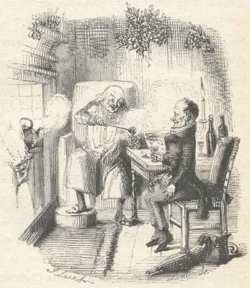God’s Speculative Story
The Christmas season is full of speculative stories.
 First up is the “jolly old elf” himself, Santa Claus. The story may have started with the real-life Saint Nicholas of Myra who secretly dropped gifts of money into windows, but modern storytelling turned him into a fat man living at the North Pole with an army of elves, working all year to prepare for one day: the day he hops into a sleigh loaded with presents for every child on Earth, pulled by a contingent of flying reindeer into the sky, and in one night delivers all those gifts to each child in the world. Usually by sliding down a chimney (who builds a chimney like a slide—shouldn’t that be falling down a chimney?) with a sack of gifts to place under each Christmas tree. How could he do all that? Maybe Santa’s really a Time Lord with a sleigh-shaped Tardis.
First up is the “jolly old elf” himself, Santa Claus. The story may have started with the real-life Saint Nicholas of Myra who secretly dropped gifts of money into windows, but modern storytelling turned him into a fat man living at the North Pole with an army of elves, working all year to prepare for one day: the day he hops into a sleigh loaded with presents for every child on Earth, pulled by a contingent of flying reindeer into the sky, and in one night delivers all those gifts to each child in the world. Usually by sliding down a chimney (who builds a chimney like a slide—shouldn’t that be falling down a chimney?) with a sack of gifts to place under each Christmas tree. How could he do all that? Maybe Santa’s really a Time Lord with a sleigh-shaped Tardis.
Then there’s Rudolph the Red Nosed Reindeer, a story about one of a group of flying reindeer with a glowing nose that can cut through thick fog better than a car’s headlights. That way Santa knows where he’s going. See what I did there? Santa knows. Nose. Glowing . . . oh forget it.
Speaking of speculation, what about a snowman who comes to life? Could be a horror story, but with Christmas, it is a cute, lovable, and polite creature generated by a magical hat. Which makes me speculate what else that hat can bring to life. I’d avoid putting it on a chain saw. Yikes!

Scrooge and Bob Cratchit — a hand colored etching by John Leech (1809 – 1870), from A Christmas Carol by Charles Dickens (1812 – 1870)
Another notable mention is Charles Dickens’ “A Christmas Carol.” Here, ghosts lead an old man to see just how bad his life has been by showing him his past, present, and future. There have been so many versions of this story made, that if they were to put them all into books, the whole world would not be big enough to contain them.
The list could go on. Sorry if I left your favorite out.
There is another story that some also believe to be fiction.
Indeed, it is the reason why some Christians suggest it is unhealthy to read fiction, because it might not only replace truth, but cause one to associate God’s truth with fiction.
After all, the real story of Christmas is just as fantastical as any of the above. An infinite God who has no beginning or end, becomes a finite human, part of His creation, by being born of a virgin. The omnipresent God, who uses the Earth as His footstool, resides in Mary’s womb as a baby. On top of that add in angelic choirs, wise men following a star, angels dishing out directions from God, and you have about as much fantastical events as any fantasy novel you could read.
Some Christians fear that by reading and watching entertaining fiction stories, that people will grow up considering Biblical stories, like Christmas, to be just as much fantasy as the latest Games of Thrones novel. To a degree, this can be supported by pointing to famous people in history who came to such a conclusion.
But did they reach those conclusions because of the fantastical nature of those stories, including the Christmas story? Or because they rejected anything fantastical as being real?
After all, if you believe in God as the Bible portrays Him, there’s no problem. It isn’t the fantastical nature of a story that makes it fantasy. Rather, it is whether the creator of that story can bring it into existence or not. Guess what? God is the only author who can do that.
What I imagine, speculate, write, and speak when I create a story can never be real, no matter how unfantastical it is. Whatever God imagines, speculates, writes, and speaks becomes real, no matter how fantastical it is.
It is impossible for me to create anything other than fiction. It is impossible for God to create fantasy. When He speaks, reality listens.
This world, this creation, this life, since the moment God said, “Let there be light,” until at the Last Judgment when God ends this creation as we know it, is God’s speculative book. A book with the most intricate world building ever, the most complex plot containing billions of side-plots more amazing than any novel written by man. A story with a diverse cast numbering in the billions yet each one unique and integral to the various plots and The Plot. The scenery hits all our senses with stunning reality and jaw-dropping vistas upon which all man-written novels are but shadowy reflections at best.
Indeed, it is God’s story that is the template upon which all other novels are judged for their believability and realism. After all, if a character in one of our man-made novels were to write a story, could they ever hope to supersede their author? To our character, the world and life we create in our novel is their reality.
How fantastical the elements of a story are don’t make it a fantasy, but rather who is writing the story.
We know the story of Santa Claus, Rodolph, Frosty, and Scrooge are made-up, not real, sometimes having little directly to do with Christ and the “Reason for the Season.” They can serve the real story, but they are not the basis upon which the Christmas celebration derived its meaning, as much as the non-Christian might want to focus on them and relegate the story of Christ’s birth as one more fantastical story in a long list.
The difference is that God created this story of which the birth of Jesus Christ is an important part of the plot. Acknowledging Him as the author of this unfolding existence we are living is what makes our creations fantasies, and His speculations reality.
Writing and reading speculative fiction can’t make God’s story fiction for a reader unless they no longer believe God is the Author of Life.
In two days, we who believe Him to be the Author of Life will celebrate that part of God’s story. We’re not celebrating Santa Claus, Rodolph, or Frosty. Those are fun stories with their own value, but their authors are human, and that’s what makes them fiction.
Merry Christmas and a most blessed celebration of God’s astounding plot twist in Christ!










































